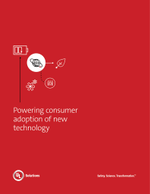
Battery Services Brochure (Consumer Electronics)
UL Solutions' battery cell certification services can test to all applicable industry standards to help ensure the performance, reliability and safety of battery cells used in an ever-growing number of products.

Manufacturers and consumers want trustworthy assurance regarding the performance, reliability and safety of battery cells used in an ever-growing number of products. We offer a targeted array of services designed to give all stakeholders increased confidence in these products.
We test and certify lithium-ion cell battery separators to UL 2591, Outline of Investigation for Battery Cell Separators, or custom test protocols to help ensure battery integrity and safety meet the capabilities and demands needed to compete safely in today’s market.
Our electromagnetic compatibility (EMC) service enables you to optimize your own in-house testing capabilities to identify and resolve EMC problems as early as possible.
Traditionally, battery cells have been certified to UL 1642, the Standard for Lithium Batteries. Widely known to apply to lithium-ion batteries, this Standard focused on portable consumer applications. It was not tailored to the needs of motive or stationary applications.
With the recent development of robust safety standards for newer battery applications, we can now certify cells for use in motive, transportation or stationary applications to the corresponding application-based Standard: UL 2271, the Standard for Batteries for Use in Light Electric Vehicles (LEV) Applications; UL 2580, the Standard for Batteries for Use in Electric Vehicles; or UL 1973, the Standard for Batteries for use in Stationary Vehicle Auxiliary Power and Light Electric Rail (LER) Applications. This means fewer samples required for testing, reduced conditioning requirements and increased overall speed to market.
We help you achieve global market access with advisory services, testing and certifications to UL Standards specific to batteries, electrochemical capacitors, fuel cells and related energy storage technologies. We also assist with transportation and regional standards, as well as assist with obtaining local country marks, including:
Testing can be combined into a single, turnkey conformity assessment based on individual customer needs. We will handle the entire streamlined process and deliver the applicable certification marks/certificates upon successful completion.
Our testing includes capacity claims, charge/discharge cycling, overcharge abilities, environmental and altitude simulation, and combined temperature cycling and vibration testing.
We offer performance certification marks for the following standards:
Our engineering team of industry experts will also conduct custom research for manufacturers, to spot problems, remediate risk, and provide documentation of due diligence.
Research areas include:

Battery Services Brochure (Consumer Electronics)
Thanks for your interest in our products and services. Let's collect some information so we can connect you with the right person.